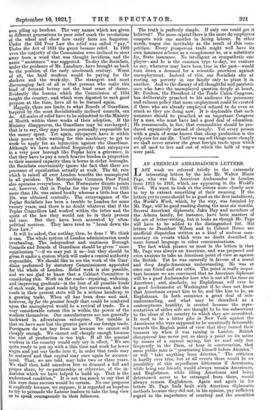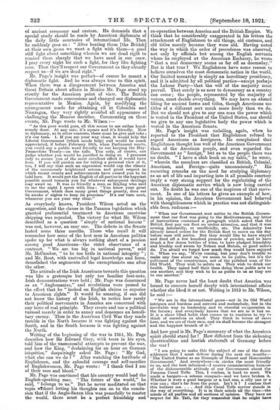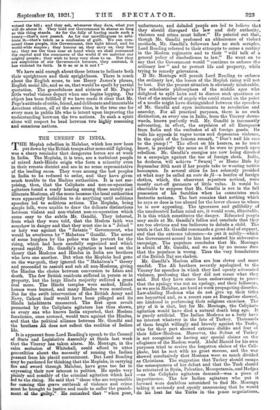AN AMERICAN AMBASSADOR'S LETTERS. T _AST week we referred briefly to
the extremely I interesting letters by the late Mr. Walter Hines Page, who was the American Ambassador in London from 1913 to 1918, which are appearing in the World's Work. We want to look at the letters more closely now to try to extract something of their meaning. If the letters yet to come should be as good as the first instalment, the World's Work, which, by the way, was founded by Mr. Page, will be good reading during the next six months. Several American diplomats, John Hay and members of the Adams family, for instance, have been masters of the art of letter-writing, but it looks as though Mr. Page will have to be added to the distinguished list. His letters to President Wilson and to Colonel House are unofficial dispatches written as a kind of undress com- mentary on events which were no doubt described in more formal language in other communications. The fact which pleases us most in the letters is that Mr. Page was always an American, and was prepared and even anxious to take an American point of view as against the British. Yet he was earnestly in favour of a sound and deep Anglo-American understanding. He was at i once our friend and our critic. The point is really impor- tant because we are convinced that no American diplomat will be a good Ambassador here who is not all the time an American ; and, similarly, no Englishman will ever be a good Ambassador at Washington if he does not know that Americans expect him to be, and like him to be, an Englishman. In both countries a great deal of mis- understanding, and what may be described as a contemptuous hostility, is created because the repre- sentatives of either side are thought to be too subservient to the ideas of the country to which they are accredited. It used to be a bitter gibe in New York against the Americans who were supposed to be uncritically favourable towards the English point of view that they turned their trousers up when it was raining in London. British disapproval has never put so sharp a point on its satire by means of a current saying, but we read only too frequently in the Press, or hear in conversation, that some public man is " prostrating himself before America " or will " take anything from America." The criticism is hardly ever true, but at all events there would be no possibility of this superfluous bitterness if Americans, while being our friends, would always remain Americans, and Englishmen, while liking Americans and being determined never to be estranged from them, would always remain Englishmen. Again and again in his letters Mr. Page finds fault _ with American diplomatic methods because they did not, in his opinion, pay sufficient regard to the importance of courtesy and the amenities of ancient ceremony and custom. He demands that a special study should be made by American diplomats of the daily little courtesies of international life. Then he suddenly goes on : " After beating them [the British] at their own game we want a fight with them—a good stiff fight about something wherein we are dead. right to remind them sharply that we • have sand in our craw. I pray every night for such a fight, for they like fighting men. Then they'll respect our Government as they already respect us—if• we are dead right."
Mr. Page's insight was perfect—of course he meant a diplomatic fight. And he was always true to this spirit. When there was a disagreement between America and Great Britain about affairs in Mexico Mr. Page stood up stoutly for the American point of view. The British Government made concessions and changed our diplomatic representative in Mexico. Again, by modifying the arrangement made for obtaining oil in Colombia and Nicaragua, they very rightly avoided all appearance of challenging the Monroe doctrine. Commenting on these events, Mr. Page wrote to Mr. Wilson :— " As this poor world goes, all this seems to me rather hand- somely done. At any rate, it's square and it's friendly. Now in diplomacy, as in other contests, there must be give and take ; it's our turn. 1. If you see your way clear, it would help the Liberal Government (which needs help) and would be- much appreciated, if before February 10th, when Parliament meets, you could say a public word friendly to our keeping the Hay- Pauncefote Treaty—on the tolls. You only, of course, can judge whether you would be justified in doing so. I presume only to assure you of the most excellent effect it would have here. If* ou will pardon me for taking a personal view of it, too, too I will say that such an expression would cap the climax of the enormously heightened esteem and great respect in which recent events and achievements have caused you to be held here. It would put the English of all parties in the happiest possible mood towards you for whatever subsequent dealiTTs may await us. It was as friendly a man as Kipling who said to me the night I spent with him : You know your great Government, which does .many great things greatly, does not lie awake o' nights to keep its promises.' It's our turn next, whenever you see your way clear."
As everybody knows, President Wilson acted on the suggestion, and the clause in the Panama legislation which granted preferential treatment to American coastwise shipping was repealed. The victory for what Mr. Wilson described as a question " simply of national honour " was not, however, an easy one. The debate in the Senate lasted some three months. Those who recall it will remember how some of the best men•in American politics spoke up for what is always nothing short of a passion among good Americans—the strict observance of a contract. " We are too big. in national power," said Mr. McCumber, " to be too little in national integrity " ; and Mr. Root, with unrivalled legal knowledge and force, demolished the arguments of the exemptionists one after the other.
The attitude of the Irish Americans towards this question was like a grotesque but only too familiar foot-note. Irish demonstrations were held ; Mr. Page was denounced as an " Anglornaniac," and, resolutions were passed to the effect that he " looked on English claims as superior to American rights." It would be amazing, if one did not know the history of the Irish, to notice how rarely their political movements in America are concerned with any issue of real principle. They create and use a political turmoil merely in order to annoy and denounce an heredi- tary enemy. Thus in the American Civil War they made trouble in the North because it was fighting against the South, and in the South because it was fighting against the North.
Writing of the beginning of the war in 1914, Mr. Page describes how Sir Edward Grey, with tears in his eyes, told him of the unsuccessful attempts to prevent the war, and how the King, " declaiming for an hour on German iniquities," despairingly asked Mr. Page : " My God, what else can we do ? After watching the fortitude of Englishmen, and the splendid courage and self-sacrifice of Englishwomen, Mr. Page wrote : courage I thank. God I am of their race and blood."
Mr. Page was convinced that his country would lead the English-speaking race. " The future of the world," he said, " belongs to us." But he never meditated on that topic without letting his thoughts run on to the conclu- _sion that- if the Anglo-Saxon idea was peacefully to master the world, there must be a perfect friendship and co-operation between America and the British Empire. We think that he considerably exaggerated in his letters the attachment of Englishmen to old things, old customs, and old titles merely Englishmen they were old. Having noted the way in which the order of precedence was observed, not only by officials but among the English servants whom he employed at the American Embassy, he wrote " that a real democracy seems as far off as doomsday." But is that true ? We Englishmen have some reason to believe ourselves the most democratic nation in the world. Our limited monarchy is simply an hereditary presidency, and it is admitted by all political parties—except perhaps the Labour Party—that the will of the majority must prevail. That surely is as near to democracy as a country can come ; the people, represented by the majority of voters, must decide everything. We may have an absurd liking for ancient forms and titles, though Americans use titles • of a different sort much more freely than we do.
But we should not give to any one man the power which is vested in the President of the United States, nor should we give to any one legislative body the power which is vested in the American Senate.
Mr. Page's insight was unfailing, again, when. he reported to the President that Englishmen refused to regard Americans as foreigners. He, complained that Englishmen thought less well of the American Government than of the American people, and even regarded the Government as " foreign," but as to the people there was no doubt. "I. have a club book on my table," he wrote, " wherein the members are classified as British, Colonial, American, and Foreign—quite unconsciously." His recurring remarks on the need for studying diplomacy as an art of life and imparting into it all possible courtesy imply a. very strong support for the regularizing of the American diplomatic service which is now being carried out. No doubt he was one of the inspirers of that move- ment. In one of his letters he gives an example of how, in his opinion, the American Government had behaved with thoughtlessness which in practice was not distinguish- able from rudeness - When our Government sent notice to the British Govern- ment that our fleet was going to the Mediterranean, my letter of instructions contained a paragraph which asked that the British fleet pay our fleet no undue attention, and that it was coming informally, or unofficially, etc. The Admiralty has already issued orders for the British fleet to move on the day before ours will arrive. But they would like to have stayed and fired off a few hundred pounds of powder, and to have drunk a few dozen bottles of wine, to have pledged friendship and kinship and sworn by Nelson and Mahan, as good sailors do. I'm afraid we -forget how much they would have enjoyed it. When we say, ' We're coming, but- pray don't trouble to make any fuss about us,' we mean to be polite, but it's the politeness of the countryman, not of the polished man of the Old World. They wish to salute us. They wish to drink our health. They spend half their time doing-these polite acts to one another, and they wish to be as polite to us as they are to one another."
Mr. Page never had the least doubt that America was bound to concern herself deeply with international affairs whether she liked it or not. Writing in 1913 to Mr. Wilson, he said :- " We are in the international game—not in its Old World intrigues and burdens and sorrows and melancholy, but in the inevitable way to leadership and to cheerful co-operation in the future ; and everybody knows that we are in it but us. It is a sheer blind habit that causes us to continue to try to think of ourselves as aloof. They think in terms of races here, and we are of their race, and we shall become the strongest and the happiest branch of it."
And how good is Mr. Page's summary of what the American spirit should stand for 1 How different from the sickening theatricalities and loutish statecraft of Germany, before the war " I am going to make this the subject of one of the dozen addresses that I must deliver during the next six months- ' The United States as an Example of Honest and Honourable Government.' And everywhere in circles the most friendly to us, and the best informed—I receive commiseration because of the dishonourable attitude of our Government about the Panama Canal Tolls. This, I confess, is hard to meet. We made a bargain—a solemn compact--and we have broken it. Whether it were a good bargain or a bad one, a silly one or a wise one ; that's far from the point. Isn't it Y I confess that this bothers me. . . . And this Canal Tolls matter stands in the way of everything. It is in their minds all the time—the minds of all parties and all sections of opinion. They have no respect for Mr. Taft, for they remember that he might have vetoed the bill ; and they ask, whenever they dare, what you will do about it. They hold our Government in shame so long as this thing stands. As for the folly of having made such a treaty—that's now passed. As for our unwillingness to arbi- trate it—that's taken as a confession of guilt. We can com- mand these people, this Government, this tight island, and its world-wide empire ; they honour us, they envy us, they fear us ; they see the time near at hand when we shall command the capital and the commerce of the world if we unfetter our mighty people ; they wish to keep very close to us. But they are suspicious of our Government because, they contend, it has violated Its faith. la it so or is it not " We have said enough about these letters to indicate both their uprightness and their sprightliness. There is much about the English scene, to use Henry James's phrase, English social life, and so on, that would be spoilt by partial quotation. The gracefulness and airiness of Mr. Page's little verbal visions depart when one begins lopping. Our object has been fulfilled if we have made it clear that Mr. Page's attitude of critic, friend, and deliberate and immutable American citizen, all at the same time, is the true one for every man in public life who is intent upon improving the understanding between the two nations. In such a spirit alone will respect be bred between two highly reasoning and oonscious nations.




































 Previous page
Previous page